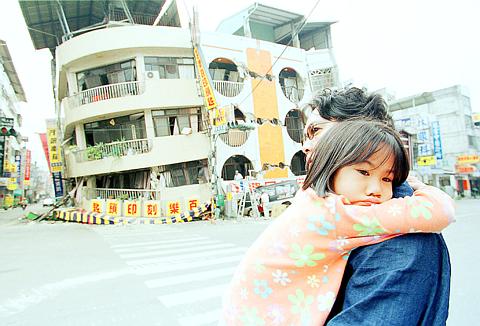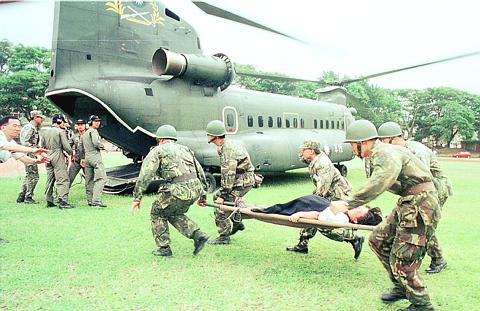Powerful aftershocks continued to shake Taiwan yesterday following Tuesday's deadly earthquake, delaying rescue work as emergency teams continued to dig through piles of twisted metal and concrete left by collapsed buildings, searching for survivors.
Rescue efforts were centered on the two worst-affected areas of Tai-chung and Nantou Counties near the quake's epicenter, but also continued in Taipei.
The Central Weather Bureau recorded a strong aftershock at 8:14am, measuring 6.8 on the Richter scale and centered in the mountains near Chichi, Nantou County, approximately 200km south of Taipei. It was followed by a less powerful temblor half an hour later, measuring 6.1. Another with a strength of 6.0 struck early yesterday evening.

PHOTO: LIN CHENG-KUNG, LIBERTY TIMES
The aftershocks, which were felt throughout the island, collapsed more buildings, triggered rock and mud- slides, and partially damaged the Sun Moon Lake Reservoir near the epicenter. Residents in areas adjacent to the reservoir were urged to evacuate their homes. Reports said dam managers were releasing water from the reservoir as a precaution.
Seismologists also warned there could be more aftershocks in the days to come, cautioning the public to be prepared.
Altogether there have been more than 2,000 aftershocks following the main quake early Tuesday morning which had a strength of 7.6.

PHOTO: SHING TING-WEI, LIBERTY TIMES
As of press time the Disaster Management Center said 2,034 people were confirmed dead. Another 6,536 were injured and 2,308 were trapped, while 208 were still listed as missing.
The day's rescue efforts had yielded just nine people pulled alive from the wreckage compared with more than 300 dead. The chances of many more victims being found alive looked slim.
Workers who had already cleared blocked roads in some mountainous regions found themselves having to repeat their efforts as the aftershocks shook loose fresh mud and other debris.
In Taichung County's Fengyuan a sniffer dog's whimper was regarded as a hopeful sign that someone was still alive under the rubble of a toppled 12-story building.
But hope was fading fast as the number of bodies surpassed the number of those still alive.
"I don't think there will be any more survivors," said one neighbor who only gave her name as Liu. "This morning they already found three people. All were dead," she said, watching a chain of soldiers wearing surgical masks clear debris from the pile of concrete, tile and splintered wood.
The aftershocks made people in the disaster-stricken areas all the more anxious to get to safety.
Panicking survivors in Puli, Nantou County, close to the epicenter of the quake, tried to leap into helicopters as they picked up the wounded or dropped off medical and food supplies.
One pilot said he had to fight off a small crowd who dangerously overloaded his aircraft when he landed at a high school.
"There is only space for 10 people," he said. "I wish I could carry out everyone. I feel like crying. However loud the helicopter is, I can still hear the people howling at me."
Another pilot described how a fist-fight had broken out between two families at Puli as he explained he could not take them all.
"We had to split the family up and leave the ones who weren't injured," he said.
As rescue efforts went into their second day, around 500 personnel from 14 nations, many armed with experience from the recent disaster in Turkey, were in Taiwan to aid the rescue efforts.
Rescue teams from the US, Japan, Singapore, Russia, the Czech Republic, Switzerland, and Austria have all arrived on the island, some teams accompanied by sniffer dogs. Mean-while Spain, Britain, Israel, South Korea, and Thailand have contacted the Ministry of Foreign Affairs to offer rescue teams.
The United Nations Office for the Coordination of Humanitarian Affairs (OCHA) has sent a seven-member evaluation team to Taiwan to coordinate rescue work carried out by foreign rescue teams. The OCHA decided to send the humanitarian assistance after consultations with China, which did not pose any objection.
OCHA may only provide assistance if it is requested to do so by a sovereign government. Since the UN recognizes Beijing as the sovereign government of Taiwan as part of its "one China" policy, in theory providing assistance depended on it being asked to do so by Beijing.
It remains uncertain whether Beijing made such a request or OCHA suggested it provide aid and then sought Beijing's approval. A spokesman for Taiwan's foreign ministry, however, said yesterday that Taiwan had certainly not asked OCHA for UN assistance.
The ministry was prepared, however, to let the UN team enter Taiwan because it felt that disaster relief took precedence over political disputes.
Later, Liu Teh-hsun (
Liu was responding to a statement by a spokesperson for Beijing's foreign ministry that Beijing thanks the international community for their sympathy and aid to Taiwan. Such remarks implied that Beijing controlled Taiwan and could speak for its people.
Meanwhile, condolences from world leaders continued yesterday, with Canadian Prime Minister Jean Cretien and Tibetan spiritual leader the Dalai Lama expressing shock and sadness at the disaster.
In a letter to President Lee Teng-hui (
Finance Minister Paul Chiu (

ACTION PLAN: Taiwan would expand procurement from the US and encourage more companies to invest in the US to deepen bilateral cooperation, Lai said The government would not impose reciprocal tariffs in retaliation against US levies, President William Lai (賴清德) said yesterday, as he announced five strategies to address the issue, including pledging to increase Taiwanese companies’ investments in the US. Lai has in the past few days met with administrative and national security officials, as well as representatives from various industries, to explore countermeasures after US President Donald Trump on Wednesday last week announced a 32 percent duty on Taiwanese imports. In a video released yesterday evening, Lai said that Taiwan would not retaliate against the US with higher tariffs and Taiwanese companies’ commitments to

Intelligence agents have recorded 510,000 instances of “controversial information” being spread online by the Chinese Communist Party (CCP) so far this year, the National Security Bureau (NSB) said in a report yesterday, as it warned of artificial intelligence (AI) being employed to generate destabilizing misinformation. The bureau submitted a written report to the Legislative Yuan in preparation for National Security Bureau Director-General Tsai Ming-yen’s (蔡明彥) appearance before the Foreign Affairs and National Defense Committee today. The CCP has been using cognitive warfare to divide Taiwanese society by commenting on controversial issues such as Taiwan Semiconductor Manufacturing Co’s (TSMC, 台積電) investments in the

HELPING HAND: The steering committee of the National Stabilization Fund is expected to hold a meeting to discuss how and when to utilize the fund to help buffer the sell-off The TAIEX plunged 2,065.87 points, or 9.7 percent, to close at 19,232.35 yesterday, the highest single-day percentage loss on record, as investors braced for US President Donald Trump’s tariffs after an extended holiday weekend. Amid the pessimistic atmosphere, 945 listed companies led by large-cap stocks — including Taiwan Semiconductor Manufacturing Co (TSMC, 台積電), Hon Hai Precision Industry Co (鴻海精密) and Largan Precision Co (大立光) — fell by the daily maximum of 10 percent at the close, Taiwan Stock Exchange data showed. The number of listed companies ending limit-down set a new record, the exchange said. The TAIEX plunged by daily maxiumu in just

‘COMPREHENSIVE PLAN’: Lin Chia-lung said that the government was ready to talk about a variety of issues, including investment in and purchases from the US The National Stabilization Fund (NSF) yesterday announced that it would step in to staunch stock market losses for the ninth time in the nation’s history. An NSF board meeting, originally scheduled for Monday next week, was moved to yesterday after stocks plummeted in the wake of US President Donald Trump’s announcement of 32 percent tariffs on Taiwan on Wednesday last week. Board members voted to support the stock market with the NT$500 billion (US$15.15 billion) fund, with injections of funds to begin as soon as today. The NSF in 2000 injected NT$120 billion to stabilize stocks, the most ever. The lowest amount it